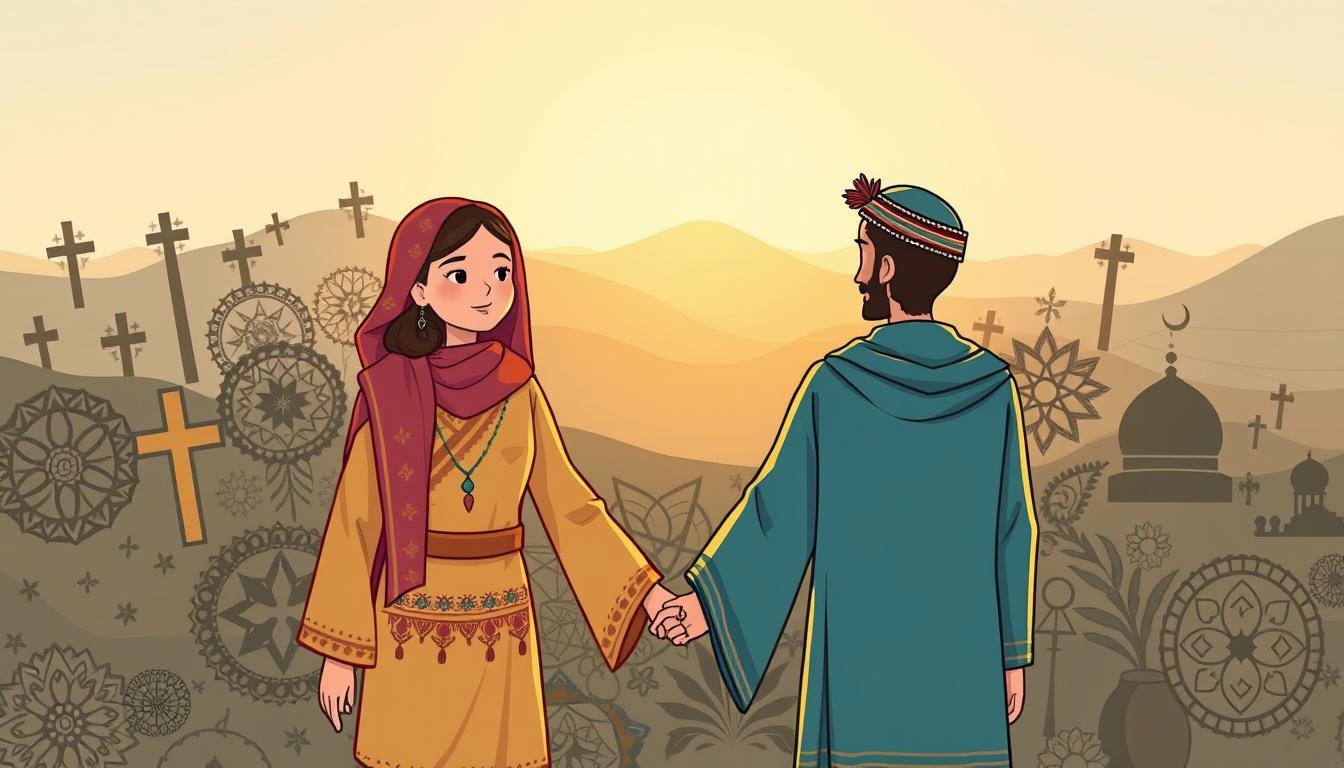Have you ever thought about how love crosses faith lines? For millions, interfaith marriage is both a dream and a challenge. It’s where shared values meet sacred texts.
As someone who’s been on this journey, I’ve seen these marriages grow or cause tension. The big question is not just about the law. It’s about who decides a child’s faith and how families with different beliefs come together.
In the U.S., one in ten Muslim couples in interfaith marriages face questions about their children’s faith. The Qur’an allows Muslim men to marry Christian women. But cultural rules, like in Malaysia, add more complexity.
Christian teachings also struggle with the idea of marrying a Muslim. These issues are not new but are more visible today.
What happens when a child’s faith is decided by law, not by choice? Or when a spouse’s faith changes the family’s dynamics? This article doesn’t judge. It looks closely at religious marriage laws and real-life examples.
Through this, we’ll see how love deals with theology. For every couple, family, and community, these choices change what it means to belong. Muslim Christian marriage is more than rules. It’s about building bridges where faith and family meet.
Understanding Interfaith Marriage in Modern Society
Interfaith relationships are changing how families work together, like in the U.S. where almost one in six Muslims under 40 marry outside their faith. This change shows more religious diversity. But, it also brings challenges when cultural norms and religious teachings don’t match. Interfaith relationships need to understand how traditions meet or clash with laws and beliefs.
“We have created you male and female, and have made you into nations and tribes, in order that you might come to know one another.” (Qur’an 49:13)”
The Rise of Interfaith Relationships in America
In the U.S., 10% of Muslims now marry outside their faith, similar to Canada. These numbers show changing social norms. But, cultural expectations often stay behind legal acceptance. Many couples find ways to work through these differences, with the help of imams or clergy who support interfaith marriages.
Cultural vs. Religious Considerations
Cultural differences, like holiday traditions or food choices, can be talked through. But, religious differences need deeper thought. Islamic law says Muslim women can’t marry non-Muslim men, but men can marry Jewish or Christian women. This creates a challenge for couples to respect each other’s beliefs. Guidance on compatibility suggests talking openly about beliefs, like prayer and raising children.
Legal Recognition vs. Religious Recognition
Civil law may accept marriages, but religious groups might not. A U.S. court might see a Christian-Muslim union as valid, but a mosque might not. This makes couples choose between what society accepts and what their faith teaches. The question is: Can religious diversity bring people together, or does it split faiths?
Can a Christian and Muslim Get Married? The Basic Answer
Many ask if a Christian and Muslim can get married. The answer involves understanding interfaith marriage rules. These rules come from religious texts and cultural backgrounds.
Islamic law allows a Muslim man to marry a Christian woman if she is chaste and stays true to her faith. But, a Muslim woman cannot marry a Christian man. These rules come from the Quran and how people see family ties.
There’s a story of ʿOthmān ibn ʿAffān, who married a Christian woman named Nāilah early in Islam. But today, scholars like Sheikh Yusuf al-Qaradawi say this is makrūh (disliked) because of spiritual issues. The Catholic Church also needs special permission for such marriages, as stated in Canon Law 1086.
“Our marriage works because we both believe in Jesus,” shared one couple in a 2022 Pew Research study. “But navigating holidays like Easter and Eid requires constant dialogue.”
In the U.S., civil marriages are allowed, even if people from different faiths get married. But, religious rules mean these marriages might not be recognized in mosques or churches. Important factors include if the Muslim man can fulfill his duties, if the Christian partner believes in one God, and if they agree on raising children.
This question shows Islam’s complex view: okay for men but needing careful thought. As we dive deeper, these rules affect not just weddings but also the spiritual paths of those who marry across faiths.
Islamic Perspectives on Interfaith Marriage
Islamic laws guide how Muslims see interfaith marriages. The Quran allows Muslim men to marry Christian or Jewish women under certain rules. But it doesn’t let Muslim women marry outside their faith. This rule comes from verses like 5:5 and 2:221, which talk about spiritual and moral matches.
Quranic Verses About Marriage to People of the Book
Verse 5:5 says Muslim men can marry chaste women from the People of the Book. This includes Christians and Jews, as long as they respect Islamic values. The Quran wants partners who are righteous, not just allowed.
But, Muslim women marrying non-Muslim men is a big debate. Some say verse 60:10 stops Muslim women from marrying outside their faith. This rule has been in place for a long time but is questioned today.
Gender Differences in Islamic Interfaith Marriage Rules
Islamic law lets Muslim men marry Christians, but it’s strict for Muslim women. The old rules say it’s important to keep children’s faith. But some say this rule is outdated.
Some scholars, like Khaleel Mohammed, say we should focus on respect, not strict rules. They believe in finding common ground in marriage.
“Justice, not exclusion, should guide marriages,” they argue, stressing the importance of shared values.
Varying Interpretations Among Islamic Schools of Thought
Old schools like Hanafi and Maliki stick to strict rules. But some reformists see things differently. They think about verses like 5:5, which talks about faith and chastity, not just bans.
Modern scholars want to focus on mercy and justice, not just old rules. This shows how Islam is changing to fit today’s world, balancing tradition with kindness.
Christian Views on Marrying Muslims
Looking into Christians marrying Muslims, the Bible on interfaith marriage often points to 2 Corinthians 6:14. This verse warns against being “unequally yoked” with non-believers. It highlights the importance of spiritual unity in marriage.
Many Christian groups see this as a reason to avoid marrying those who don’t believe in Christ. Muslims, for example, see Jesus as a prophet, not the Son of God. This difference can cause big problems.
For instance, Roman Catholics need special permission for such marriages. They have strict rules to ensure children are raised in the faith. Protestant views vary, with some accepting interfaith marriages and others not.
Eastern Orthodox traditions usually say no to these unions. The Christian perspective on Muslim spouse often depends on whether the marriage keeps faith intact.
Practical issues come up when beliefs differ. Ephesians 5:22-33’s comparison of Christ and the Church makes things complicated. Some couples find ways to agree, but others struggle with religious practices or raising children.
Conversion pressures can also be a problem. Christian women in these marriages might face demands to give up their faith. Scholars like George Saieg have talked about this.

Scripture talks about love and peace, but the journey is not easy. My research shows many couples pray and compromise to make it work. Yet, the gap in beliefs remains.
So, the big question is: Can love overcome differences in faith?
The Concept of Religious Conversion Before Marriage
Choosing to convert for marriage is a big decision. It involves thinking deeply about spiritual beliefs and religious identity. Some see it as a way to join together, but others worry about making quick choices.
Does saying a prayer under pressure really show true belief? In places like Malaysia, laws can make changing religions hard. This is shown in Lina Joy’s story, where courts didn’t accept her switch to Christianity.
Converting to Islam for Marriage
In Islam, becoming a Muslim means following the Quran’s teachings. But in Malaysia, Sharia courts can fine or rehabilitate those who leave Islam. This makes it hard for Muslims to marry outside their faith.
Many Malays are Muslim, but they face legal and social hurdles. Converts must be sure their beliefs are strong. Marriage should not come before faith.
Converting to Christianity for Marriage
Christianity values being true to oneself over convenience. In the U.S., 19% of adults now say they have no religion. This shows people are changing their beliefs.
But, making someone convert can be stressful. In some Muslim countries, Christians who used to be Muslim can get jailed. It’s important to grow spiritually before getting married.
Impact on Identity and Faith
Changing religions can affect a marriage. Some Muslim women say their marriages made them more religious. But others struggle with their identity.
The big question is: Does changing faith bring people together or drive them apart? Keeping true to one’s faith is key to a happy marriage.
Raising Children in Christian-Muslim Families
Raising kids in a family with different faiths needs patience and clear communication. Islamic teachings say Muslim dads must teach their kids about Islam (Quran 66:6). This can be hard for Christian families.
Many couples find a way to balance both faiths. Like the family in this article, they chose to focus on Islam but also share Christian traditions.
“We’re raising our kids to understand both faiths but base their foundation on Islamic practices,” shares the author, balancing Quranic guidance with respect for their Christian heritage.
Religious Identity and Education
Islamic texts say parents must teach kids about faith, as seen in Quran 66:6. Christian teachings, like Proverbs 22:6, also stress teaching faith from a young age.
Some families choose one faith but also teach about the other. The book Being Both by Susan Katz Miller helps families raise kids who understand both faiths. Talking openly about differences early helps kids understand their heritage.
Navigating Religious Holidays and Traditions
Celebrating holidays like Ramadan and Christmas is a chance to teach kids. Families might fast during Ramadan and celebrate Easter. They focus on values like charity and gratitude.
Finding creative ways to celebrate traditions is important. For example, lighting a Christmas tree and explaining its cultural importance alongside Eid’s rituals. This helps Muslim Christian kids understand and respect both faiths.
Ceremony Options for Christian-Muslim Couples
Planning a interfaith wedding ceremony needs creativity and care. Many couples have two ceremonies. One is led by an imam, and the other by a Christian officiant. Others choose a civil ceremony with blessings from both sides, skipping religious hierarchy.
Blended ceremonies are rare but possible. I’ve seen couples use texts like 1 Corinthians 13:4-5 and Surah al-Baqarah 2:187. They focus on love and commitment, shared by both faiths.
The Ashtiname from 623 CE is a guide. It says Christian spouses can worship freely under Islamic rule. Modern couples use greetings like As-salamu alaykum and Bible readings.
Rev. Dr. Samora Smith has officiated 2,500 ceremonies. He says blending traditions works when based on respect. 
“Love is patient, love is kind”—a truth in both scriptures.
Officiants from groups like American Marriage Ministries and IAPWO create scripts that balance faiths. But, some leaders won’t co-officiate. To find harmony, talk about your core values.
What texts or symbols unite you? A thoughtful interfaith wedding ceremony celebrates shared humanity. It’s not about merging doctrines but honoring each other’s traditions. Let tradition be a bridge, not a barrier.
Religious Leaders’ Attitudes Toward Interfaith Marriage
Interfaith marriages between Christians and Muslims are becoming more common. Religious leaders have different views on this. Some imams on interfaith marriage are open to it, while others stick to traditional views. Priests also face challenges, balancing their teachings with caring for their flock.
Recent studies show 21% of U.S. Muslims are now in interfaith marriages. This change shows a shift in attitudes.
Progressive vs. Conservative Religious Perspectives
Progressive imams and priests point to Quranic verses to bless marriages with Christians. Imam Imaad Sayeed has performed 250 such weddings in five years. This shows a change in how things are done.
But, conservative voices warn of problems. They say there are more divorces, like the 60% rate among evangelicals marrying non-religious people. These debates affect how leaders counsel and perform rituals for interfaith couples.
Finding Supportive Faith Communities
Couples look for supportive communities, like Muslims for Progressive Values. This group had 75 weddings in 2020. Despite some groups opposing these marriages, 79% of Muslims marry within their faith, a survey of 2,500 Americans found.
Even in conservative places, some clerics offer help for interfaith families. They try to balance tradition with kindness. This shows both faiths’ efforts to adapt to today’s world.
FAQ
Can a Muslim woman marry a Christian man?
What do Christians think about interfaith marriages?
How are children raised in interfaith families?
What are the legal requirements for Christian-Muslim marriages in Western countries?
What challenges do Christian-Muslim couples face during wedding planning?
How does religious conversion impact an individual’s identity?
Are there supportive faith communities for interfaith couples?

Embracing Faith, One Insight at a Time!
The teachings of the Quran have always guided my path. With a deep passion for Islamic knowledge, I strive to blend the wisdom of tradition with the relevance of today, making the timeless messages of Islam accessible and meaningful for everyone.
Muslim Culture Hub is my platform to share historical insights and thought-provoking articles, exploring both well-known and lesser-discussed aspects of Islamic culture and beliefs. My mission is to create an inclusive online space where everyone can learn, strengthen their faith, and connect with the profound message of Islam.
Join the journey!
May peace be upon you.








